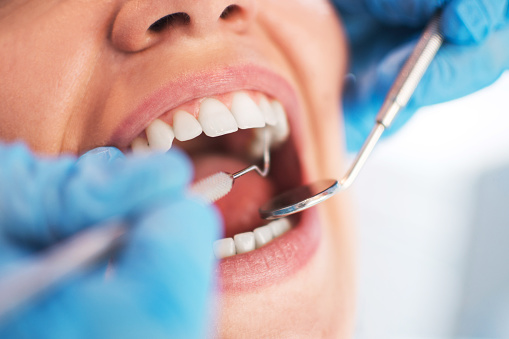What is Mouth Health?
Mouth health refers to the state of well-being of the mouth, which includes the teeth, gums, tongue, and other soft tissues. It involves maintaining the proper functioning of the mouth, preventing oral diseases, and preserving the ability to eat, speak, and smile with confidence.
Maintaining good mouth health involves several habits and practices, including:
- Brushing and flossing regularly: Brushing at least twice a day and flossing once a day can help to remove plaque and food particles that can cause tooth decay and gum disease.
- Eating a balanced diet: Eating a balanced diet that is rich in vitamins and minerals, particularly calcium and vitamin D, can help to promote healthy teeth and gums.
- Limiting sugary and acidic foods and drinks: Sugary and acidic foods and drinks can erode tooth enamel and increase the risk of tooth decay.
- Avoiding tobacco: Tobacco use can cause oral cancer, gum disease, and other oral health problems.
- Drinking plenty of water: Drinking water can help to wash away food particles and reduce the risk of dry mouth, which can contribute to tooth decay and gum disease.
- Regular dental checkups: Regular dental checkups can help to detect and prevent oral health problems, such as tooth decay and gum disease, and ensure that any existing problems are treated promptly.
By following these practices, individuals can maintain good mouth health, prevent oral diseases, and reduce their risk of developing oral health problems. It is also essential to seek prompt treatment for any oral health problems, such as toothaches or gum bleeding, to prevent complications and promote healing.
Define Mouth Health.
Mouth health refers to the overall state of well-being of the mouth, including the teeth, gums, tongue, and other soft tissues. It involves maintaining the proper functioning of the mouth, preventing oral diseases, and preserving the ability to eat, speak, and smile with confidence. Good mouth health is important for overall health and well-being, as oral health problems can impact other areas of the body and contribute to systemic diseases like heart disease and diabetes.
To maintain good mouth health, individuals should practice good oral hygiene habits, eat a balanced diet, avoid tobacco and limit sugary and acidic foods and drinks, and schedule regular dental checkups. Prompt treatment for any oral health problems is also essential to prevent complications and promote healing.
How to Make Mouth Strong?
Here are some tips to help make your mouth strong:
- Brush and floss regularly: Brushing at least twice a day and flossing once a day can help to remove plaque and food particles that can cause tooth decay and gum disease.
- Use fluoride toothpaste: Fluoride toothpaste can help to strengthen tooth enamel and reduce the risk of tooth decay.
- Eat a balanced diet: Eating a balanced diet that is rich in vitamins and minerals, particularly calcium and vitamin D, can help to promote healthy teeth and gums.
- Limit sugary and acidic foods and drinks: Sugary and acidic foods and drinks can erode tooth enamel and increase the risk of tooth decay.
- Avoid tobacco: Tobacco use can cause oral cancer, gum disease, and other oral health problems.
- Drink plenty of water: Drinking water can help to wash away food particles and reduce the risk of dry mouth, which can contribute to tooth decay and gum disease.
- Chew sugar-free gum: Chewing sugar-free gum can help to stimulate saliva production, which can help to neutralize acid and wash away food particles.
- Get regular dental checkups: Regular dental checkups can help to detect and prevent oral health problems, such as tooth decay and gum disease, and ensure that any existing problems are treated promptly.
By following these tips, you can help to maintain good mouth health, prevent oral diseases, and reduce your risk of developing oral health problems. It is also essential to seek prompt treatment for any oral health problems, such as toothaches or gum bleeding, to prevent complications and promote healing.



